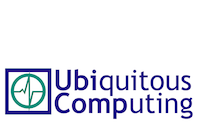Ubiquitous Computing -- Lecture -- WS2017
This lecture will give an overview on relevant concepts and
technologies (such as the history of ubiquitous computing and
underlying visions, embedded systems and cyber-physical
systems, mobile computing, wearable computing, and wireless
sensor networks). It will also deal with more specific subjects
(e.g., context awareness, activity recognition, privacy and
security issues, research methods in this emerging field). Case
studies will also be given during breaks to give more insights
in current developments and the lessons and pitfalls that
researchers and engineers have met while deploying such novel
systems.
Description:
Size: 2 hrs lecture + 2 hrs exercises (5LP)
Lecture: Thu. 12:15-14:00 Uhr in room US/D/109
Exercises: Thu. 14:15-16:00 Uhr in room US/D/109
Lecturer(s): Kristof Van
Laerhoven, Florian Wolling
LSF links: Lecture:
43UCO1111V, Exercises:
43UCO1112V
Overview of the Lecture:
1. Introduction to Ubiquitous Computing
Organisation, Basics, Vision of Ubiquitous Computing
2. Wearable Computing, Nomadic Technology
History of Wearable Computing, Wearable Input/Output,
Intelligence Augmentation
Designing for wearable use and wearable experiment
designs, security and privacy
3. Wireless Sensor/Actuator Networks, Smart Dust
WSN basics, background technologies, applications
WSN operating concepts, Events and threads, MAC
protocols, Contiki
4. Physical Interaction, Tangible Interfaces
Human physiology, predictive/descriptive models for
interaction
Tabletop computing, Tangible user interfaces
5. Context Awareness, Detecting Activity, Location
Context Awareness, Recognition of activities, features,
classifiers, evaluation
Location Awareness, Fusion Approaches
6. Critical Systems Design, Security & Privacy
First examples, Privacy definitions and history
Cryptography basics, Critical systems design
7. Designing Experiments for UbiComp
Experiments, study design and study types, new
methodologies
Example questions
Exercise Material and Schedule:
1. Introduction
Organization, Goals, Time Schedule, First Task
2. Presentations [1/5]
Initial paper A: "The Computer for the 21st Century",
Mark Weiser
Group A:
[26.10.17]
Initial paper B: "GestureWrist and GesturePad", Jun
Rekimoto
Group B:
[02.11.17]
3. Presentations [2/5]
Initial paper A: "As we may think", Vannevar Bush
Group A:
[09.11.17]
Initial paper B: "An Autonomous 16 mm3 Solar-Powered
Node for Distributed Wireless Sensor Networks", Warneke
et al.
Group B:
[16.11.17]
4. Presentations [3/5]
Initial paper A: "The Ariane 5 Accident: A Programming
Problem?", Peter B. Ladkin
Group A:
[23.11.17]
Initial Paper B: "Change Blind Information Display",
Stephen Intille
Group B:
[30.11.17]
5. Presentations [4/5]
Initial Paper A: "Contact Sensing and Interaction
Techniques", Visell et al.
Group A:
[14.12.17]
Initial paper B: "What shall we teach our pants?",
Laerhoven and Cakmakci
Group B:
[11.01.18]
6. Presentations [5/5]
Initial paper A: "Privacy by Design, Principles of Privacy-Aware Ubiquitous Systems", Langheinrich
Group A:
[18.01.18]
Initial paper B:
Group B:
[25.01.18]
Weekly presentation scores:
The following plots show averaged questionnaire scores given
by the audience after each talk. Note that these scores are not
used in the grading, they are solely for your direct
feedback.
